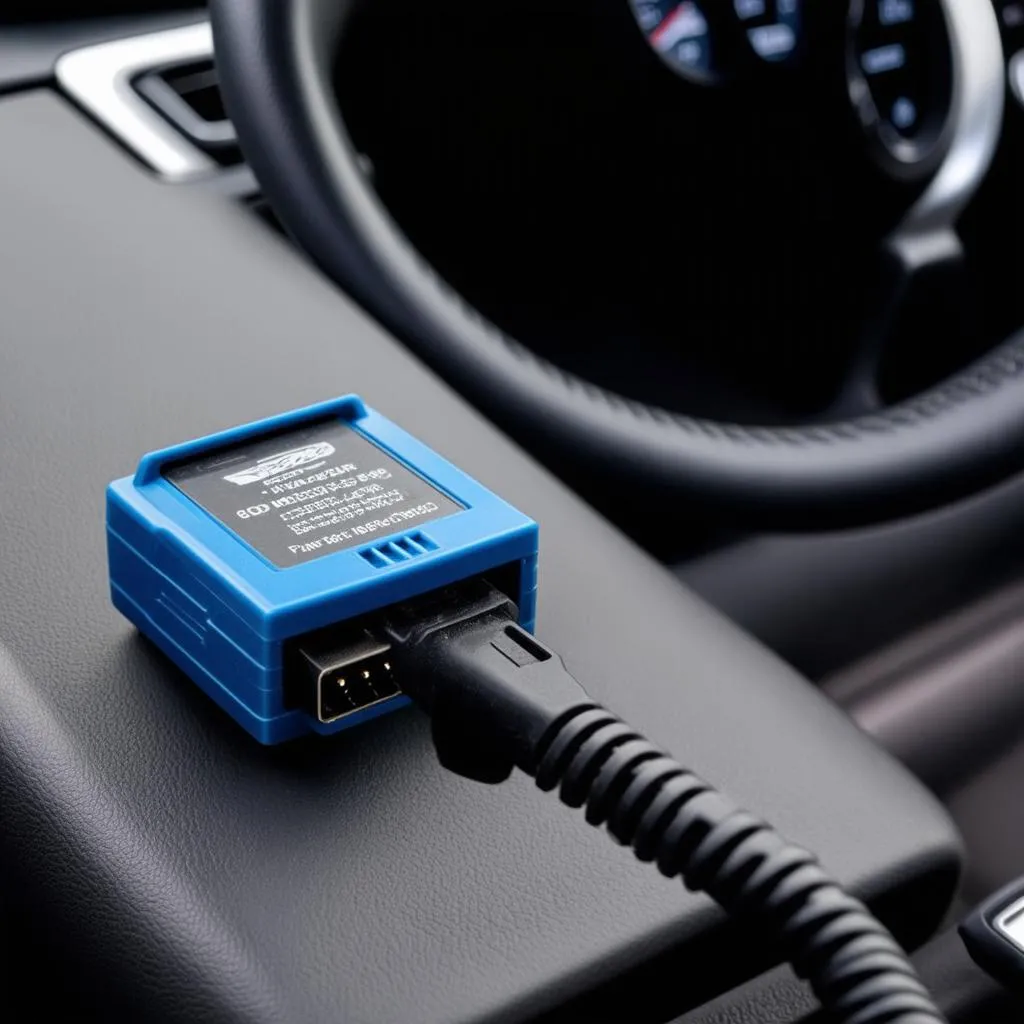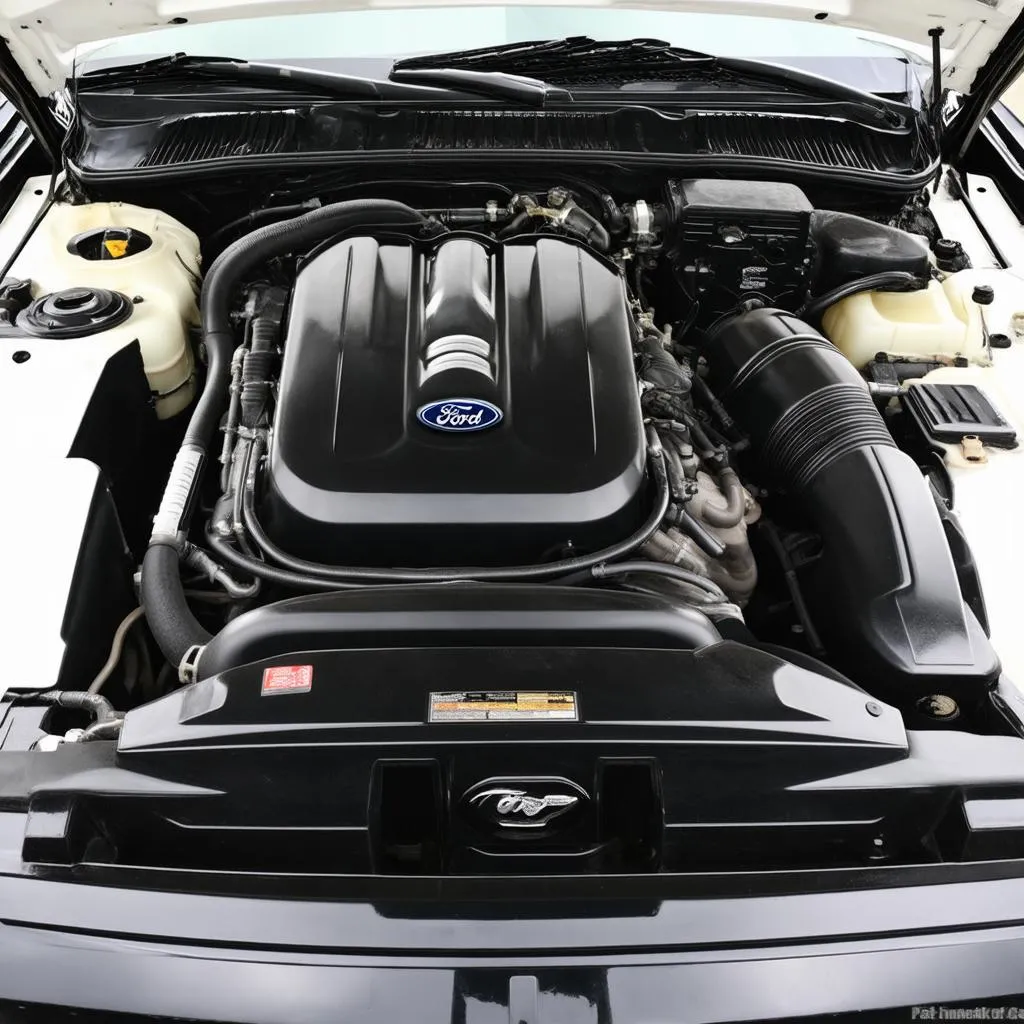“Check engine” light got you feeling like you’re driving blind? Don’t sweat it! We’ve all been there, staring at that little orange glow on our dashboard, wondering what secrets our 2002 Mustang is trying to tell us. The key to unlocking those mysteries lies in the often-overlooked OBD system. Think of it as your Mustang’s own personal translator, speaking the language of codes to help you diagnose and fix any issues.
But navigating the world of OBD codes can feel like trying to read hieroglyphics, right? Not to worry! This guide is your Rosetta Stone to understanding your 2002 Mustang Obd system, empowering you to take control and keep your pony running strong.
Decoding the 2002 Mustang OBD: What Does It All Mean?
OBD stands for On-Board Diagnostics, and in the case of your 2002 Mustang, it’s OBD-II, the second generation of this technology. Essentially, your car’s computer system is constantly monitoring various sensors and systems. When something isn’t quite right, it triggers a code and that pesky “check engine” light illuminates.
Why is this a big deal?
- Early Detection: OBD-II acts as an early warning system. Catching issues early can save you from costly repairs down the line. Just like a stitch in time saves nine, an OBD code diagnosed early can save your wallet a heavy burden!
- Empowerment: No more relying solely on mechanics! Understanding your OBD system gives you the power to diagnose problems yourself, arming you with knowledge before heading to the shop.
- Peace of Mind: Knowing what those codes mean can ease your mind. A minor sensor glitch won’t have you fearing the worst-case scenario.
Troubleshooting Your 2002 Mustang: Common OBD Codes and Solutions
Let’s dive into some common OBD codes for the 2002 Mustang and what they usually indicate:
P0401: EGR System Insufficient Flow Detected
This code pops up when your Mustang’s Exhaust Gas Recirculation (EGR) system isn’t flowing as it should. The EGR system helps reduce emissions, and a problem here could impact your engine’s performance and fuel efficiency.
Possible Causes:
- Clogged EGR valve
- Faulty EGR valve solenoid
- Vacuum leaks in the EGR system
Troubleshooting Tips:
- Inspect the EGR valve for carbon buildup and clean or replace if necessary.
- Check the EGR valve solenoid for proper operation.
- Look for any vacuum leaks in the EGR system hoses and connections.
P0171: System Too Lean (Bank 1)
This code signals that your engine is running lean, meaning there’s too much air compared to fuel in the air-fuel mixture. This can lead to decreased performance, rough idling, and even engine damage over time.
Possible Causes:
- Vacuum leak in the intake manifold
- Faulty oxygen sensor (Bank 1)
- Dirty or faulty Mass Airflow Sensor (MAF)
- Fuel injector problems
Troubleshooting Tips:
- Inspect the intake manifold for leaks and repair any found.
- Check the operation of the oxygen sensor (Bank 1) and replace if needed.
- Clean the MAF sensor or replace it if faulty.
- Have the fuel injectors inspected and cleaned or replaced as necessary.
P030X: Misfire Detected (Cylinder X)
This code, where “X” represents a specific cylinder number (e.g., P0302 for cylinder 2), indicates a misfire in that cylinder. Engine misfires can cause rough idling, reduced power, and increased emissions.
Possible Causes:
- Faulty spark plug
- Worn spark plug wires
- Faulty ignition coil
- Injector problems (clogged or malfunctioning)
- Vacuum leak
Troubleshooting Tips:
- Replace the spark plugs and wires if they are old or worn.
- Inspect the ignition coil for proper operation and replace if needed.
- Check the fuel injector for the affected cylinder and clean or replace if necessary.
- Inspect for any vacuum leaks around the intake manifold and vacuum hoses.
 OBD Scanner plugged into a 2002 Ford Mustang
OBD Scanner plugged into a 2002 Ford Mustang
Beyond the Codes: Tips for Maintaining Your Mustang’s Health
- Regular Check-Ups: Just like regular doctor visits keep you healthy, routine maintenance is crucial for your Mustang. Schedule those oil changes, tune-ups, and inspections to prevent small problems from escalating into major headaches.
- Listen to Your Mustang: Pay attention to any unusual noises, vibrations, or changes in performance. Early detection is key to preventing costly repairs.
- Quality Parts: When repairs are needed, invest in quality parts. Remember, your Mustang deserves the best!
Feng Shui and Your 2002 Mustang: Finding Harmony on the Road
Believe it or not, even car maintenance can benefit from a touch of Feng Shui. Think of your Mustang as an extension of your personal space. A clean and organized car can promote a sense of calm and control, while clutter can lead to feelings of stress and distraction.
Feng Shui Tips for Your Mustang:
- Declutter: Remove any unnecessary items from your car.
- Cleanse: Regularly clean the interior and exterior of your car to promote positive energy flow.
- Air Freshener: Choose a natural air freshener with a calming scent like lavender or sandalwood.
 Clean Engine Bay of a Ford Mustang
Clean Engine Bay of a Ford Mustang
Need a Helping Hand? We’re Here for You!
Feeling overwhelmed? Don’t worry! At TechCarUSA, we’re passionate about empowering car owners with the knowledge and tools they need to keep their vehicles running smoothly.
Have questions about your 2002 Mustang’s OBD system or need help diagnosing a tricky code? Contact our team of automotive experts via WhatsApp at +84767531508. We’re available 24/7 to provide guidance, support, and peace of mind.
Keep Your Mustang Roaring: Knowledge is Power
Remember, your 2002 Mustang is more than just a car; it’s a symbol of freedom and adventure. By understanding its OBD system, you’re taking a proactive step in ensuring countless more miles of open-road joyrides.
Looking for more helpful tips and tricks for your 2002 Mustang? Check out our other articles on TechCarUSA:
Happy driving!
